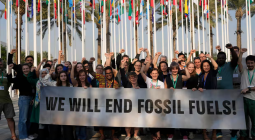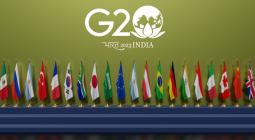G20 waters down experts’ climate finance report, despite UN pressure to act
A report by top economists on finance for climate action was weakened after feedback from G20 nations, even as the UN says they must all slash emissions
As UN chief António Guterres called on the G20 to “lead” on climate, Climate Home can reveal that the group of big countries watered down a report by top economists on how the financial system should shift to enable climate action.
Guterres made his comments by video at the launch of the United Nations’ Emissions Gap Report which showed that, under their current policies, the G20 countries as a group will fail to meet their 2030 targets to cut planet-heating emissions.
Separately, Climate Action Tracker has found that no G20 country’s policies are compatible with limiting global warming to the Paris Agreement goals of either 1.5 degrees Celsius or “well below” 2C.
“The largest economies – the G20 members, responsible for around 80% of all emissions – must lead,” Guterres said on Thursday.
He spoke as officials from G20 climate and finance ministries and central bankers gathered in Washington DC to attend a meeting of the G20 Taskforce on a Global Mobilization against Climate Change (TF-CLIMA), an initiative of the Brazilian G20 presidency aimed at bringing climate and finance officials out of their silos to talk about tackling climate change.
One of their tasks is to react to a report the taskforce commissioned from a group of 12 independent experts, led by economists Vera Songwe and Mariana Mazzucato, on how the G20 countries can shift their financial systems towards tackling climate change.
Brazil’s Secretary for Climate, Energy and Environment André Aranha Corrêa do Lago told a briefing for journalists on Wednesday that the experts were requested to do a “strong report”, going beyond what the G20 can agree to in a joint declaration. It was “important to leave as a legacy a document that shows that we believe that more is needed”, he said.
The report, published on Thursday, lists five “myths” blocking climate action, including that it will slow economic growth and that governments lack the resources to fix climate change and should leave it to the market. It recommends that G20 governments should implement green industrial strategies, reform the global financial system and scale up financing for climate projects.
Weakened after criticism
However, according to a draft of the report from September 4 seen by Climate Home, the final, public version was watered down in response to critical feedback from G20 governments through their negotiators.
Comparing the earlier and later versions, there was a weakening of various points – from criticism of the G20 to warnings over climate impacts, praise for a billionaires’ tax for climate and calls for central banks to help fight climate change.
References to “G20 inaction” were replaced with “G20 inertia”, and the line “each year the destruction to the planet is harsher than the last” was deleted. A reference to a “stark increase” in global temperatures was softened to “a temperature increase on this scale”.
Information in support of Brazil’s proposal for a 2% tax on the wealth of billionaires worldwide was also cut, including a description of the idea’s popularity with “electorates around the world”. An observation on the proposal’s “relatively straightforward” nature to implement was replaced by “questions over the feasibility of implementation”.
The September draft said France, Spain and South Africa supported the wealth tax proposal “while the US opposes it”, but this was deleted from the final version. The US has not made its position on the tax clear in public.
In addition, a recommendation that central banks and supervisory and regulatory bodies should mitigate climate-related financial risks and help mobilise private finance for green investments was modified with the caveat “within their mandates”.
A source with knowledge of discussions told Climate Home that the recommendations on central banks had been criticised by the US, EU and France, and some developing countries.
Despite these changes to the text, in a joint declaration G20 ministers only said they would “take note” of the report rather than welcoming it or agreeing to implement it.
Rebecca Thissen, global lead on multilateral processes at Climate Action Network International who has followed the talks closely, told Climate Home this was “not just a missed opportunity – it’s a deliberate oversight.”
“The G20 holds the tools for real change,” she said, “yet dismissing the very solutions presented to them is akin to ignoring the cure to a known disease, with full awareness of the consequences.”
Just transition?
On the same day, the UN Emissions Gap report warned that the 1.5C warming limit will be gone within a few years unless all countries collectively commit to cut 42% off annual greenhouse gas emissions by 2030 and 57% by 2035 in their next round of national climate plans due by next year – and back them up with rapid action.
The report showed that global greenhouse gas emissions set a new record high of 57.1 gigatonnes of CO2 equivalent in 2023, a 1.3% increase from 2022 levels, with rises in sectors from power to transport and agriculture. Guterres said emissions needed to fall 9% each year to 2030 to meet the 1.5C limit and “avoid the very worst of climate change”.
The UN report said all G20 governments must step up efforts and “do the heavy lifting” by reducing the group’s collective emissions – accounting for 77% of the global total – dramatically.
But it argued that stronger international support and more climate finance will be essential to ensure that climate and development goals can be realised fairly across G20 member countries, as well as globally.
The G20 includes some developing countries – like India, Indonesia and Brazil – that, despite being large and rising emitters today, have relatively low levels of emissions per capita and have historically contributed far less than rich, industrialised nations to global warming.
In response to a question from Climate Home, UN Environment Programme Executive Director Inger Andersen told journalists that the Emissions Gap Report recognises that some countries have a higher ability to move first, but emissions cuts are needed by all G20 nations.
“Every G20 country, irrespective of where it stands on the long historical trail, has an opportunity to lean into this investment opportunity and change its emissions structure,” she said. UN chief Guterres has nonetheless called on the wealthier ones to stretch and do even more, to leave space for those who will find it harder to meet net-zero emissions by 2050, she added.
Anne Olhoff, chief scientific editor of the report, noted that all G20 countries apart from Mexico, have made pledges to reach net-zero emissions later this century. She said those that have yet to peak their emissions – China, India, Indonesia, Mexico, Saudi Arabia, Republic of Korea, and Türkiye – should do so as soon as possible, and then start cutting them rapidly in order to meet their net-zero targets.
Yesterday’s G20 ministerial statement encouraged G20 nations to “bring forward” their net-zero pledges. Brazil’s ambassador Corrêa do Lago told journalists he believed it was the first time the G20 had made such a call.
Cover photo: UN head Antonio Guterres witnesses hurricane damage in Antigua and Barbuda in 2017 (Photo credit: UN photo/Rick Bajornas)





